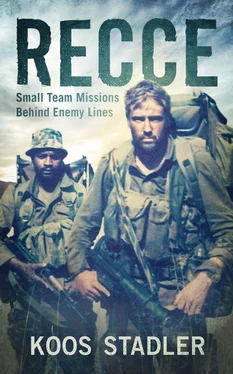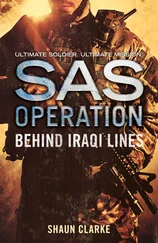Looking back on the venture today, I am relieved that the operation had to be aborted. Had those ANC leaders been killed, it would have had serious ramifications for South Africa and could very likely even have disrupted the negotiations for a peaceful settlement.
“In a world where death is the hunter, my friend, there is no time for regrets or doubts. There is only time for decisions.”
– Carlos Castaneda,
Journey to Ixtlan
AFTER OUR failed operation at Menongue airfield, Diedies and I discussed the prospects for a similar penetration of the FAPLA airfield at Lubango, from where the bulk of FAA’s fighter aircraft operated. [16] FAA, or Força Aérea Angolana, is the Angolan Air Force.
In addition to the fighter-bomber regiment HQ, the air base hosted a MiG-23 squadron, a MiG-21 squadron and a variety of helicopters, including the much-feared Mi-24 gunship. No fewer than 56 fighters were parked in areas at both ends of the runway, some in revetments and the majority on the apron.
A penetration of the airfield had not previously been considered feasible, since it was surrounded by enemy deployments. Soviet-supplied air defence systems, both radar and missiles, were positioned on the mountains to the west and southwest, while Cuban, FAPLA and SWAPO bases were spread around its perimeter.
However, before anything else I first had to deal with a personal crisis. It was at this point that my past experiences started to catch up with me. I had crawled around enemy bases in the dark one too many times. Too often I had been on the wrong side of an AK-47 being cocked in the clear, quiet night. Slowly but surely, my mind started telling me that the odds would turn against me.
A horrible dream started to haunt me: I would be stalking a dark and ominous house under the trees, alone, with a full moon completely blinding my vision. I knew the enemy was lying in wait, but had no choice but to crawl towards the house. Behind me I could hear movement, enemy moving in to cut off my escape, and I knew there was no way out; I just had to keep crawling towards my inevitable fate.
I told Diedies about my dream and how I repeatedly relived the tense moments during the final stalk into enemy bases. Diedies was very supportive and understood the predicament I was in, having been in that dark place before. We talked about it on numerous occasions, but in the end the dream would still be there, tangible and ever-present.
One day Diedies cut straight to the chase and asked whether I wanted to continue to operate or preferred to opt out, offering to let me stay on at Small Teams in a supporting role and act as Tac HQ commander for a while. But I had come too far in preparing myself for the ultimate in soldiering. There was no way I was giving it up because of a few bad dreams. I assured Diedies that I was set on my job, but that I needed time to work through this thing.
At the time, Johnny Koortzen, an old friend from school, was the psychologist at Special Forces HQ. I phoned him from Phalaborwa and asked whether we could meet for a chat. Johnny must have read between the lines; he immediately said he was keen to talk to me since he was doing a study on the impact of acute stress on Special Forces soldiers. I was due to take the military law course in Pretoria, which gave me an opportunity to see Johnny and, more importantly, to spend time with Zelda.
To this day I don’t know whether I was wise or stupid not to talk to Zelda about my fears, but I opted not to show what I saw as my weakness. I therefore also did not tell her the real reason for my visit to Pretoria. It didn’t even cross my mind that sharing my fears and uncertainties with her could have eased my burden. While I didn’t want to acknowledge it, our relationship was taking strain as a result of our hectic programme and uncertain schedule.
When I walked into Johnny’s office that first day, I swallowed my pride and told him about my growing sense that fate would catch up with me, and how the next time I bumped into enemy soldiers in some godforsaken guerrilla base in Africa would be my last. He listened patiently, occasionally prompting me with questions. Over several meetings, I told him about every incident since my days at 31 Battalion recce wing – every time we approached or infiltrated an enemy base, every time I had to run away to survive, every single time I had to evade an aggressive enemy on our tracks.
Just recalling all those incidents was a great relief, as the only people we ever talked to, once the debrief was done and the top-secret files had been stowed away, was the tiny inner circle of Small Teams. I had never even shared war stories with my colleagues from the commandos, as I thought it would breed animosity. And besides, talking about events from highly secret operations would have been considered a security breach.
For the first few days Johnny and I just talked about my experiences. He asked me to explain my fears and describe my recurring dream in the finest detail. Then we gradually started turning negative thoughts into positive ones, countering every weakness with a strength.
Did I believe in what I was doing?
Yes.
Did I want to do it?
Yes, I was ready to do that and much more.
How did I manage to find enemy bases out there in the bush?
Because the Int was accurate and my navigation was tip-top.
How did I get to penetrate right into the enemy base?
Because I was good at it and we were well prepared.
How did I get out of the base once we were compromised?
Because the enemy did not expect us there and we knew exactly where to go.
How have I survived all the close shaves before?
Because I was prepared .
How did I get away from an enemy that was chasing us?
Because I was extremely fit and good at anti-tracking.
How did I not get tied up in encirclement?
Because we were well rehearsed and knew the terrain. The darkness was our friend and we were exceptionally good at night work.
In time, Johnny reinforced in me the solid foundation on which our deployments were based: good intelligence, capable operators, well-rehearsed operations, emergency plans, the best equipment money could buy, a strong support system, faith…
Together we started building a strategy to help me manage my fear. From the beginning he made it clear that we would not try to defeat the sense of fear, but rather develop a mechanism for me to accept that it was inevitable and learn how to cope with it. It reassured me when he told me that, regardless of their bravado, every operator feared death and every one had their own way of dealing with it. He also pointed out that few operators repeatedly penetrated enemy bases alone, or with only one buddy in support. Most people found solace in numbers and did not like being alone in the bush – let alone inside enemy-infested encampments!
Johnny then worked with the concept of fear itself, and after talking about it for hours I started realising that, as a Christian, my fear was not for the actual moment of dying, but rather the uncertainty of the moment; the fear of failure or of being captured was more significant.
To counter my fear of failure, we built a strategy based on the conviction that I was better at my job than any adversary I would encounter. Not marginally better, but exceptionally so. Steadily I started to realise that every training event, every night bent over the maps and stereoscopic photos, every rehearsal was not only a skill to be mastered but also something to be ingrained in my mind as an attitude. Johnny helped me to apply a simple but effective technique in which negative thoughts and attitudes were replaced by positive ones – by giving the bad thoughts a “dirty” colour and draining them from my mind, replacing them with the bright, colourful, positive ones.
Читать дальше












